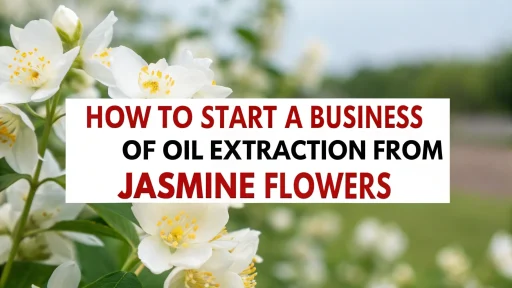The enchanting scent and therapeutic properties of jasmine oil extraction from Jasmine Flowers make it a favorite in the aromatherapy, skincare, and wellness industry. Jasmine oil, one of the most expensive oils available on the market, is not only a sign of luxury and purity but also a great opportunity for entrepreneurs to get into the essential oil industry.
A jasmine oil extraction business requires a combination of agricultural expertise, technical knowledge of the extraction process, and investment in high-quality equipment. It also involves an understanding of global demand for natural scents. This guide provides a comprehensive overview of the steps to starting and scaling a jasmine flower oil business. It covers everything from harvesting to entering the market.
Jasmine Flower Oil: Its Meaning and Use
Absolute is a highly regarded oil derived from the jasmine flower. Jasmine oil was used in ancient Indian and Middle Eastern medicines. It is said to have natural antidepressant and antiseptic properties. It is used in luxury spa treatments, high-end fragrances, skincare products and massage oils.
The low yield of oil extraction from jasmine flowers makes it a valuable and difficult oil to obtain. The oil can be extracted from thousands of jasmine flowers, which makes it one of the most expensive essential oils. This high price is offset by the increasing demand in the wellness, cosmetics, and aromatherapy sectors, both domestically and internationally.
Related: Groundnut Oil Manufacturing – Is it the right business for you?
The Extraction Process – From Jasmine Blooms To Liquid Gold
Jasmine Oil extraction from jasmine flowers is a delicate process that must be done with precision in order to maintain the chemical and natural integrity of the oil.
In the morning, when jasmine flowers are at their most fragrant, flower harvesting begins. Flowers may be picked by hand in large-scale operations to avoid bruising and ensure the purity of the oil.
Two widely used methods of extraction are:
- Steam Distillation: Although steam distillation is common for most essential oils, it is not used with jasmine because of its heat sensitivity. In some hybrid jasmine varieties, distillation can still produce mild essential oils.
- Jasmine is best extracted using a solvent. Fresh flowers are combined with food-grade solvents like hexane to dissolve the aromatic compounds. The waxy concrete is then further processed with alcohol to create jasmine oil, a high-quality and concentrated oil.
Some boutique producers now explore supercritical CO2 extract, a method without solvents that produces cleaner oil. This method is more expensive to set up.
No matter the method, it is important to maintain temperature, timing and freshness of flowers. Incorrect handling at any stage can lead to loss of aromatic compounds and contamination of oil.
Materials and Equipment Required
The quality of jasmine flowers is crucial to the success of any jasmine oil venture. The cultivation of jasmine can be done either independently or by contract farming with local farmers. Growing conditions that are ideal include well-drained soils, warm climates and adequate irrigation.
You will also need:
- Solvents
- Distillation units and solvent extraction machines
- Filtration systems and centrifuges
- Laboratory testing equipment (Gas Chromatography for Purity Analysis)
- Packaging and bottling Units
- Cold storage or drying racks are ideal for flower preservation
The machinery investment will depend on the size of your business, whether it is small, medium, or export-oriented.
View our Handbooks on Essential Oils Extraction and Processing
Certifications and Regulatory Compliance
Before launching production, entrepreneurs must ensure legal compliance. The following licenses and certificates are typically required in India and other major production centers:
- Business registration (Udyam/MSME/Private Ltd.
- FSSAI certification is required if oils are being used for food or wellness categories
- ISO 9235 Certification for Natural Essential Oil Purity Standards
- Pollution Control Board approval for solvent use
- Local authorities can issue a trade license
- DGFT Export Import License (IEC Code) for International Trade
- Labeling requirements under the Drugs and Cosmetics Act for personal care products
Registering with associations like EOAI or APEDA can also help you gain credibility.
Related: Red Onion Oil Business: How to Launch a Profitable Brand
Market Demand and Industry Forecast
Global Market Dynamics
Industry reports predict that the global essential oil market will reach USD 27.5 billion by 2030. This represents a CAGR of over 8.5%. Floral oils, namely jasmine, rose and tuberose, are expected to grow at a steady rate within this segment due to the growing interest in natural scents and wellness products.
In France, the UAE, the USA and Japan, jasmine oil is highly valued. Jasmine oil that is organic-certified has a loyal and niche customer base at aromatherapy centers and Ayurveda centres around the world.

India’s position in the market
India is a leading producer and exporter of jasmine oils, especially in Tamil Nadu and Karnataka. Not only does India export bulk oils, but it also produces value-added items such as aromatherapy oils blended with soaps and traditional attars.
The domestic demand for essential oils is also increasing sharply, thanks to an increase in disposable incomes, the growth of the wellness and spa industries, and a return to traditional remedies. Indian consumers are increasingly looking for organic, paraben-free, and natural products. This is creating a steady demand for essential oil, including jasmine.
Market Forecast Table
| Year | Global Essential Oil Market (USD Billion) | Demand for Jasmine Oil (Est. Global Share (%) | India’s Essential Oil Export in INR Cr. |
| 2022 | 18.0 | 5.5% | 5200 |
| 2023 | 20.2 | 5.7% | 5850 |
| 2024 | 22.1 | 6.0% | 6400 |
| 2025 | 24.4 | 6.2% | 7100 |
| 2030 | 27.5+ | 7.0%+ | 10,000+ |
Source: Industry Analysis Reports (NAR), NPCS and EOAI

Opportunities for Business Growth
The jasmine oil industry is a great place to innovate and grow. One can also scale up to B2B markets by supplying jasmine oils in bulk to cosmetic and perfume manufacturers.
Diversification of products can also lead to new markets, such as jasmine-scented diffusers and bath oils.
Indian producers can now brand their oil as a premium product in the global market due to consumer interest in sustainability, organic farming, and traceability.
Jasmine Oil Business: Challenges and Opportunities
The growth opportunities are great, but there are also challenges. The jasmine is a seasonal flower and it’s highly perishable. This means that you need to process the flower in real time. Weather fluctuations may affect crop yields and labor-intensive harvesting can impact profitability.
The main operational challenges are maintaining consistent oil quality in batches, managing volatile international prices, and ensuring compliance with environmental regulations (especially when it comes to solvent extraction).
Why this Business makes sense for Entrepreneurs
The jasmine oil niche is one where luxury meets wellbeing, and it is growing stronger over time. Entrepreneurs who are in the natural product space can benefit from:
- Globally, people are increasingly choosing to consume chemical-free and plant-based ingredients.
- India’s jasmine cultivation agroclimatic advantage
- Export incentives under Agri Export Zones & Make in India Schemes
- Branding and direct sales through e-commerce have great potential
This business is also flexible enough to scale up or down according to market demand. It’s a great option for entrepreneurs, family businesses, and startups with access to land and farmer networks.
For more information, check out this video on Jasmine oil Extraction
The End: A Blossoming Chance
Jasmine oil extraction is a combination of science, tradition, agriculture and artistry. Jasmine oil is in high demand as global consumers look for cleaner, greener options in beauty and wellness. Its timeless aroma and natural therapeutic qualities will also continue to make it popular.
This business can be profitable, sustainable and globally scalable with the right approach in sourcing, production and compliance. If you are a startup seeking a niche or an agribusiness looking to diversify your business, then jasmine oil could be the next step on your entrepreneurial journey.
Find the Best Idea for Yourself With our Startup Selector Tool
About NPCS
NIIR Project Consultancy Services provides detailed feasibility reports, research on the market, and startup advice for industries such as essential oils, perfumery and specialty chemicals. Our reports contain raw materials, production methods, machinery details and layout planning. They also include financial projections.







